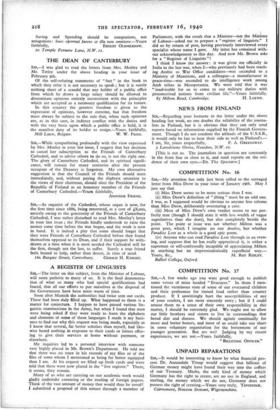A REGISTER OF LINGUISTS
SIR,—The letter on this subject, from the Minister of Labour, will seem pathetic to many of us. It is the final demonstra- tion of what so many who had special qualifications had feared, that all our efforts to put ourselves at the disposal of the Government have been mere waste of time.
Soon after Munich the authorities had twice sent out cards. These had been duly filled up. What happened to them is a matter for conjecture. I happen to have passed various lin- guistic examinations in the Army, but when I found that men were being asked if they were ready to learn the alphabets and elements of some of these languages I made it my busi- ness to find out why this request was being made, especially as I knew that several, far better scholars than myself, had like- wise heard nothing in response to their cards or letters offer- ing to give their services at home without payment, or elsewhere.
My inquiries led to a personal interview with someone very highly placed in Mr. Brown's Department. He told me that there was no trace in his records of my files or of the files of some whom I mentioned as being far better equipped than I am. At his request we filled up fresh cards and were told that these were now placed in the " live register." There, it seems, they remain.
Many of us who are carrying on our academic work would gladly undertake censoring or the reading of foreign papers.
Think of the vast amount of money that would thus be saved!
I submitted a proposal of this nature through a member of
Parliament, with the result that a Minister—not the Minister of Labour—asked me to prepare a " register of linguists." I did so by return of post, having previously interviewed every specialist whose name I gave. My letter has remained with- out acknowledgement to this day. And now Mr. Brown asks for a " Register of Linguists "1 I think I know the answer: it was given me officially in India in the last war, when I—who previously had been teach- ing Arabic to War Office candidates—was seconded to a Ministry of Munitions, and a colleague—a manufacturer in peace-time—was seconded to do intelligence work among Arab tribes in Mesopotamia. We were told that it was " inadvisable for us to come to our military duties with preconceived notions from civilian life."—Yours faithfully,
85 Milton Road, Cambridge. H. LOEWE.






































 Previous page
Previous page